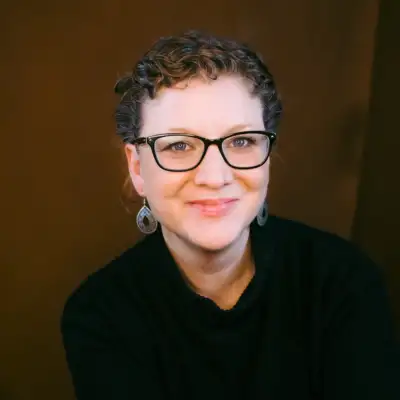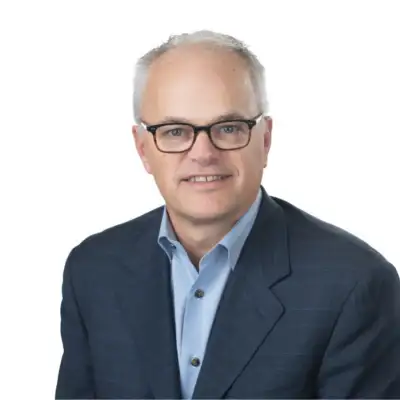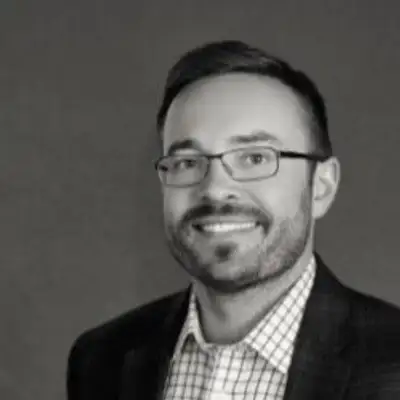Creators and Guests



What is Navigating Net Zero with Alexia Kelly?
Navigating Net Zero is a new podcast featuring conversations with practitioners and experts who are working through the complex realities of corporate decarbonization and sustainability.
We demystify and highlight the challenges, opportunities, and real-world experiences faced by the people leading their institutions' net-zero journeys.
Hosted by internationally-renowned climate change expert Alexia Kelly and brought to you by the Carbon Policy & Markets at the High Tide Foundation, Navigating Net Zero hopes to inspire action from this generation of climate leaders and the next.
Navigating Net Zero – Episode 4
Guest: Chris Davis
Host: Alexia Kelly
Alexia Kelly: Hello everyone, and welcome to the next episode of Navigating Net Zero. I’m your host, Alexia Kelly. Thanks for joining us today.
I’m here with a longtime friend, colleague, and climate hero of mine, Chris Davis. Chris has been on the frontlines of high-impact climate and conservation action for two decades, with a career spanning government, industry, and civil society. Most recently, he led Amazon’s international sustainability policy practice. Before that, he served as Governor Jay Inslee’s Chief Climate and Energy Policy Advisor in Washington State, where he helped pass landmark clean energy and carbon pricing legislation. He also spent years working on conservation finance at The Nature Conservancy.
Today, Chris is a Senior Fellow at the High Tide Foundation. For the past year and a half, he’s helped lead a new initiative we’re excited to dig into today: the Task Force for Corporate Action Transparency (TCAT). TCAT was born out of our shared experience trying to implement climate action inside companies and repeatedly running into gaps in the guidance. We couldn’t always answer key questions—either for ourselves or for the broader field. So, I’m excited to talk about this today. Chris, thank you so much for joining me.
Chris Davis: Thanks, Alexia. It’s great to be here, and I’m really excited for this conversation.
Alexia Kelly: Let’s start with your background. Can you tell us about your work as a policymaker in Washington State and then later at Amazon, leading sustainability public policy?
Chris Davis: Sure. At Amazon, I headed up the international sustainability public policy practice. When I joined, the company had just made some big climate commitments—net zero by 2040, large-scale renewable energy procurement, and putting thousands of electric vehicles on the road. There was a real sense of momentum, and also urgency.
This was also the era of Europe’s Green Deal, when sweeping clean energy and climate legislation was emerging in Amazon’s second-biggest marketplace. So it felt like a pivotal moment to align Amazon’s climate goals with broader public policy trends. I came in to expand the company’s agenda, bring some of my public-sector experience, and help build the practice.
Before that, as you mentioned, I worked for Governor Jay Inslee in Washington State. Climate action was the dominant theme of his administration, and I helped craft and advance major clean energy and carbon pricing legislation. We also did a lot to position Washington as a subnational climate leader—something the Governor was deeply committed to.
Alexia Kelly: Subnational leadership has always been critical in the U.S., and it often helps set the stage for federal action.
Let’s talk about disclosure. It’s a word we hear constantly, but many people don’t fully appreciate how dynamic and challenging the environment has become. For a company like Amazon—with global operations—how was the public policy team managing the wave of new disclosure requirements?
Chris Davis: For Amazon, it was daunting. When I joined, the company’s annual emissions were around 60 million tons across Scopes 1, 2, and 3—larger than many U.S. states, and comparable to some small countries.
Amazon’s operations are incredibly diverse: data centers, delivery, cloud services, streaming, retail. The supply chain spans the globe. So when regulations like Europe’s CSRD, emerging SEC rules, and new state-level disclosure mandates all began rolling out, it created a complex and sometimes conflicting landscape.
On one hand, Amazon wanted to use its scale to lead, share learnings, and catalyze others. On the other, uncertainty and inconsistency in the rules introduced significant risk.
Operationally, it was also a massive lift. Amazon’s sustainability team was already large—close to 100 people—but had to grow by 40–50% just to handle the disclosure workload. Integrating decentralized business units and acquired companies into a consistent reporting framework was an enormous challenge.
Alexia Kelly: Right—and that’s the tension we see everywhere. Sustainability teams spend huge amounts of time reporting. For every minute spent on disclosure, that’s a minute not spent on strategy, supplier engagement, or building decarbonization partnerships.
How do we strike that balance between the critical need for transparency and the reality of limited resources?
Chris Davis: It’s funny—I sometimes reflect on how much of my career has turned into thinking about accounting. Years ago, I told a class of grad students that greenhouse gas accounting was the skill to learn for future jobs. I said it half-jokingly, but it turned out to be true.
At Amazon, one of the most eye-opening things for me was realizing that NGO-developed standards—like those for disclosure and accounting—are effectively functioning as policy. They fill gaps where government hasn’t acted. But unlike government, NGOs aren’t accountable to broad constituencies, don’t have the same resources, and can’t always keep pace with rapidly evolving corporate needs.
That creates risk. When guidance isn’t clear or current, companies hesitate. And that hesitation slows investment and action.
Alexia Kelly: Exactly. And at the same time, we’re now seeing voluntary frameworks converging with emerging regulation. How do you see the voluntary and compliance spaces working together during this transition?
Chris Davis: We’re seeing convergence. Compliance markets have always been larger than voluntary ones, with stricter rules. But as voluntary markets evolve—and as critiques have raised the bar—standards are tightening, and the gap is shrinking.
Now, compliance systems increasingly look to voluntary frameworks for best practices, while voluntary markets borrow the credibility of compliance rules. We’re seeing less daylight between the two, and I think that’s healthy.
Alexia Kelly: Let’s shift to your time at Amazon. What surprised you most about implementing deep decarbonization in such a global, distributed supply chain?
Chris Davis: Two things.
First, the speed mismatch between business and policy. Inside government, I spent years crafting legislation and building coalitions. At Amazon, the perspective was: policy isn’t moving fast enough. If you commit to deploying 50,000 EVs in Europe, you need charging infrastructure tomorrow. If you want 100% renewable energy in Japan, you need access to wholesale markets now. Companies can’t wait. That’s why many look to market-based solutions for scale and speed.
Second, making the business case. In advocacy, we often say “sustainability is good for business” or “first movers get the spoils.” But inside a company, it’s not that simple. A delivery fleet manager in Germany doesn’t care about a think tank study—he cares about costs, balance sheets, and delivery reliability. You’re asking him to take on risk.
So, the most effective sustainability professionals are those who deeply integrate with operations and speak the company’s language of value creation. Building the business case from the inside out was a big learning for me.
Alexia Kelly: Absolutely. Profitability is still the central driver of decisions. Early movers like David Crane were punished for getting too far ahead. What tools did you use to make the case for actions that were riskier or less profitable in the short term?
Chris Davis: A few.
First, building out a strong team on the ground in key regions to both shape policy and advocate internally. That gave us capacity and credibility.
Second, invoking Amazon’s culture of long-term thinking. For example, we supported EU policies to set EV standards for delivery trucks—even though it raised short-term costs—because we believed it would lower costs over time.
We also engaged at the International Maritime Organization on carbon pricing for shipping. Amazon alone couldn’t transform the industry, but policy could. Supporting those frameworks allowed us to align long-term business interests with climate progress.
Alexia Kelly: Let’s come back to accounting. Where did existing frameworks fall short, and how did that shape TCAT?
Chris Davis: A couple examples:
Decentralized operations. If you operate thousands of small outlets, current guidance says you need to procure renewable energy for each site individually. That’s impractical. Companies should be able to invest in large-scale clean projects that reflect their total impact. Guidance doesn’t yet allow that.
Limited access to green tech. If you need low-carbon cement but only a handful of suppliers exist, you can’t always source it where you build. Investing in scaling those technologies elsewhere should “count”—but current rules don’t accommodate that.
In both cases, markets could provide solutions, but only with clear, credible accounting frameworks. That’s what TCAT is working to provide.
Alexia Kelly: So let’s talk about TCAT. What is it, and what are you releasing?
Chris Davis: TCAT—Task Force for Climate Action Transparency—is an initiative we launched at Climate Week. It brings together NGOs, companies, and experts to fill gaps in greenhouse gas accounting guidance.
We’ve released two preliminary documents:
MARG (Mitigation Action Accounting and Reporting Guidance) – updates and modernizes guidance for a wide range of mitigation activities.
TARG (Target Accounting and Reporting Guidance) – provides templates and frameworks for consistent, comparable reporting into both voluntary and regulatory systems.
Both are designed to be third-party assurable and policy neutral. They don’t say what “counts” toward a target; they show how to quantify and report actions consistently. Our goal is to lower risk, build confidence, and accelerate corporate climate investment.
Alexia Kelly: I love that framing. It’s about building a foundation companies can use today, while informing ongoing consultations with existing standards. And importantly, it’s usable by auditors right now.
Chris, what happens next?
Chris Davis: We’re entering a pilot phase with companies testing the guidance in real-world contexts. We’ll gather feedback, refine, and publish an updated version in 2026.
We also have an advisory body, NGO endorsers, and pilot partners helping shape and validate the work. Like TCFD before it, the goal isn’t to become a permanent standard-setting body but to provide urgently needed clarity and catalyze action.
Alexia Kelly: Exactly. So let’s close here: what keeps you up at night, and what gives you hope?
Chris Davis: What keeps me up: the risk that uncertainty and disagreement—our “circular firing squads”—will slow companies from investing at the pace we need.
What gives me hope: we already have so many solutions. The future is here, just unevenly distributed. Every day, I feel privileged to work on scaling those solutions and making a real impact.
Alexia Kelly: Beautifully said. Chris, thank you for joining me on Navigating Net Zero—and for your partnership in this work.
Chris Davis: Thanks, Alexia. It’s been a pleasure.